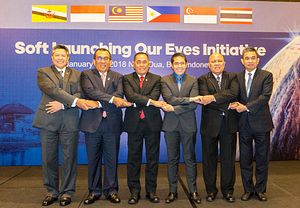This week, Indonesia and the Philippines saw another army-to-army engagement take place between them. The scheduled interaction highlighted in particular the shared threat that both countries perceive from counterterrorism and their ongoing efforts to strengthen collaboration in this area through a range of measures.
As I have noted before in these pages, Indonesia and the Philippines, both founding members of the Association of Southeast Asian Nations (ASEAN) and situated in maritime Southeast Asia, have long sought collaboration on common security challenges. That continues to be the case today as both countries pay closer attention to rising transnational threats like terrorism with the focus on the Islamic State and seek to increase collaboration in maritime security in areas including the Sulu-Sulawesi Seas, where some progress has been made in areas such as trilateral patrols.
This week, this aspect of Indonesia-Philippines defense cooperation was in the headlines with another army-to-army interaction between the two sides. Kurnia Dewantara, the commandant of the Indonesian Army Command and General Staff College (IACGSC), headed a 61-member delegation from the institution to the Philippines for an overseas study tour.
While the tour itself, which lasted from August 5 to 9, included a series of interactions, including exposing IACGSC students to military affairs, it also aims to strengthen the Indonesian Army’s ties with those of foreign countries such as the Philippines in the defense realm. And as part of that, Dewantara held a meeting with the Philippine Army chief Jesus B. Sarsagat at the Army headquarters in Fort Bonifacio, Taguig City.
During the meeting, both sides discussed a range of issues with respect to army-to-army cooperation. Per a Philippine Army statement, of particular note was the discussion of cooperation of the two armies to combat terrorism through training exchanges in both the Philippines and Indonesia. Dewantara emphasized that in the wake of shared threats such as terrorism as well as related ones such as cyber security, it was even more important to strengthen military collaboration in areas such as intelligence exchanges and training engagements to “learn from each other to develop the best approach to fight it and then solve the program together.”
Unsurprisingly, neither side provided much in the way of public disclosure about their private deliberations. Nonetheless, the engagement provided a glimpse into how both countries are viewing the importance of the challenge of counterterrorism as a catalyst for their broader collaboration in spite of the challenges that remain on this front.
































